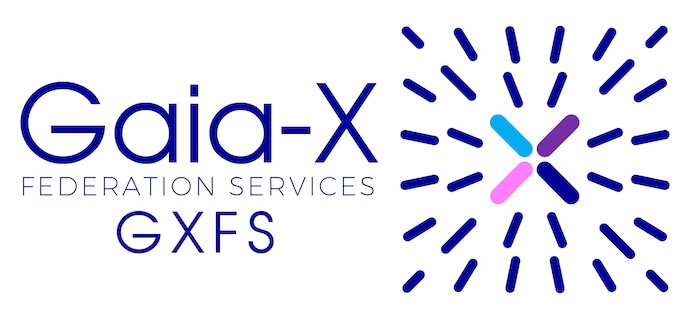
How is Gaia-X managing to make the leap forward from working groups and concept papers? Answers are provided by a study commissioned by eco – Association of the Internet Industry. Five facts, that demonstrate just how far the preliminary work on the first Gaia-X data spaces has progressed.
Impression from the funded Projects
Gaia-X is now entering a decisive phase: With the Gaia-X Federation Services (GXFS), a first version for building and organising the foundational technology of data spaces is now available. Its development was coordinated by the German project GXFS-DE under the leadership of eco and on behalf of the German Federal Ministry for Economic Affairs and Climate Action (BMWK). The GXFS was developed in cooperation with the Gaia-X European Association for Data and Cloud (AISBL), the central association of the initiative based in Brussels and the French project GXFS-FR.
The code for the GXFS will be used for the first time in the Gaia-X funded projects; these projects started their operations at the turn of 2022. Until 2024, BMWK is supporting eleven consortia for the digital flagship projects with a budget of 122 million Euro.
The team involved in the Federation Services chose to have a study undertaken to discover the degree of familiarity that the projects already have with the Gaia-X Federation Services (GXFS) and which implementation strategies they are pursuing. The study was conducted by Böcker Ziemen Consulting and headed by Dr. Jens Böcker, Professor of Marketing at the Bonn-Rhein-Sieg University of Applied Sciences.
In a two-stage approach, Jens Böcker and his team first conducted an online survey among the consortium leaders and technical leaders of all eleven funded projects. The researchers then further explored the results in seven expert interviews.
The study “Strategies for Building Gaia-X ecosystems using the Gaia-X Federation Services – In dialogue with the Gaia-X Projects” was presented for the first time at the GXFS Connect in early September in Berlin.
Division of Work between funded Projects and Federation Services
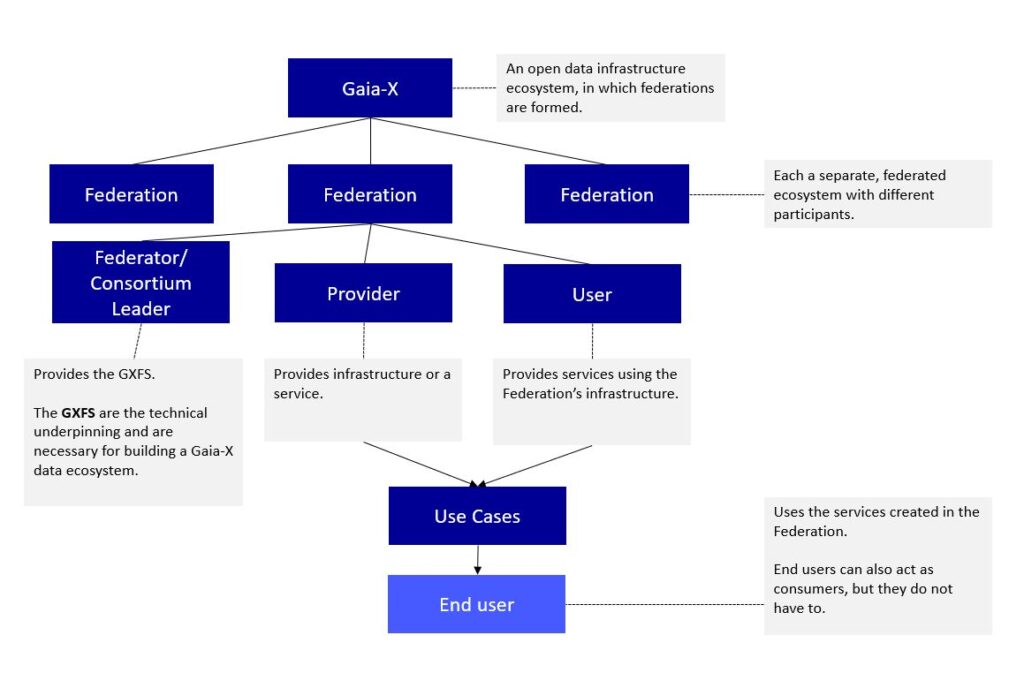
To comprehend the study, it is important to understand the division of work between the Federation Services and the Gaia-X funded projects, given that the entire initiative follows a typical European federated approach.
In the future, companies and institutions will design their own data spaces to meet their needs in line with industries, value chains, research topics or geographical spaces. To do this, they will organise themselves into self-governing Gaia-X federations that define and monitor rules and technical specifications for their members. The funded projects are undertaking pioneering work in this context: they are founding the first federations and developing the very first data spaces.
Nevertheless, the different data spaces should ultimately follow common values and be technically interoperable, i.e. they should also be able to cooperate with each other. This is where the central association AISBL and the Federation Services come into play: they take care of the common ground and lay the foundations for the European data infrastructure ecosystem in the form of rules, standards and reference architectures, as well as with the help of the Federation Services.
The GXFS is, however, not a ready-to-use product, but an open-source framework. It creates the technical basis for the development work in the funded projects and provides software components from which the teams develop and continuously improve operational services for their data spaces.
A spot-on metaphor about the Federation Services stems from Harald Wagener. The Group Leader of Cloud and IT at Charité and Head of the Health-X funded project described the GXFS as a “rope over the canyon”:
“With it, I can build the bridge, start extending it left and right and add my infrastructure to it, enabling people to get across comfortably.” – Harald Wagener, Gaia-X Project Health-X.
Fact 1: All GXFS work packages relevant for funded projects
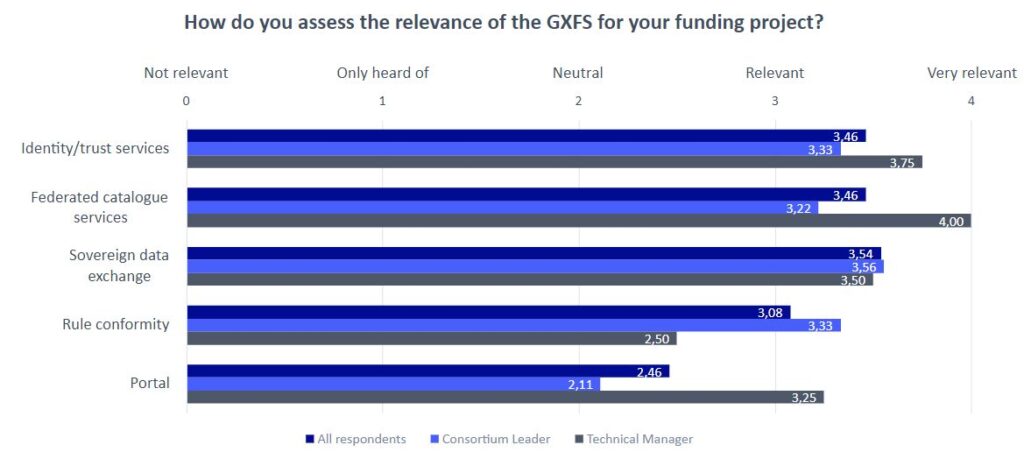
The study shows: In principle, those responsible for the funded projects rate all Federation Services as relevant for the development of use cases.
GXFS covers five topical areas or work packages:
- Digital identity management is the central building block for a trustworthy environment for exchanging data and using cloud services.
- For the first time, federated catalogues enable a standardised market overview and real comparability between providers of digital services and data sources.
- GXFS ensures sovereign data exchange by giving users control over how their data is used. Examples in this respect include services for data separation, automated contracts or logging of data transactions.
- With GXFS compliance services, a federation monitors whether participants adhere to commonly agreed rules and whether self-descriptions apply. This also includes the monitoring of regulatory guidelines – for example, in the area of data protection.
- Portals form the user interface for the various federations and data spaces. For this, GXFS also provides foundational code building blocks.
The respondents’ assessment of GXFS’s relevance varies depending on their responsibilities: The technical managers are primarily interested in the operational GXFS services that regulate access to and provision of digital services.
The consortium leaders have a multidisciplinary view, with their attention focused on users and the framework conditions – for example, for Sovereign Data Exchange or Compliance.
The ratings of the work packages Compliance and Portal are somewhat lower than the average for the other topics. The level of knowledge of the participants also has an influence on their relevance, as the next point shows.
Fact 2: Majority of funded projects in the planning phase, focus on identity & catalogue services
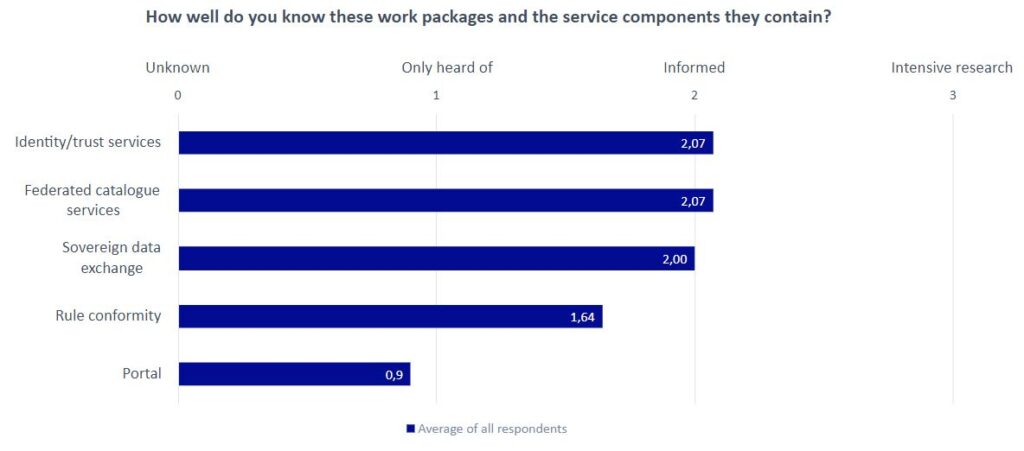
All Federation Services work packages are known in principle by the funded projects. The research focus in the first months of the project was on the Identity & Trust and the Federated Catalogue services: on the one hand, because most information was available on these work packages; on the other hand, because these services are fundamental for the practical use of the future federations.
“Innovation comes from interconnection – with the GXFS we can identify all participants without a doubt. The trust services go hand in hand with the self-descriptions and catalogue services here.” – Dr Jan Hendrik Schoenke, Gaia-X Project AW4.0.
The level of knowledge about the GXFS is also reflected in the plans for which services the project managers want to use. They are putting the topics of “Compliance” and “Portal” on the back burner for the time being.
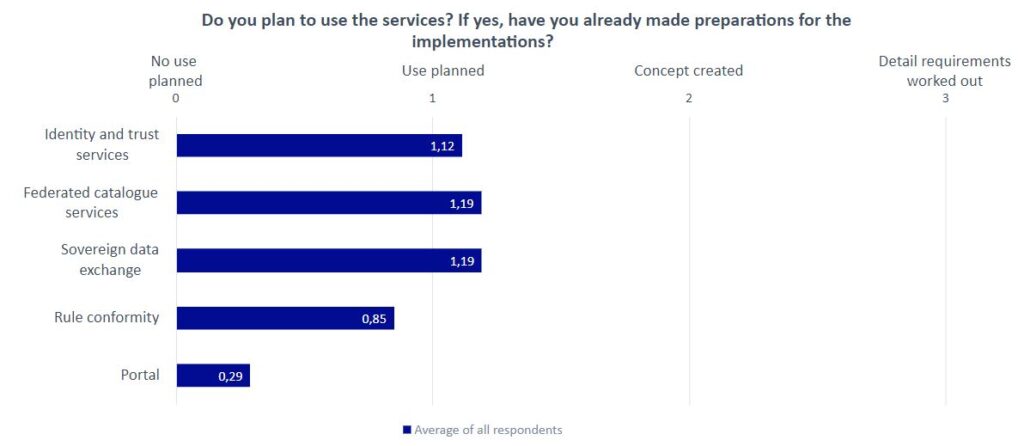
However, one should not overrate these figures: The funded projects still belong to an early planning phase. Since the beginning of 2022, the priority has been to gain an overview. With more and more GXFS services, the teams are now delving deeper into the research. They have only been able to deal with a few work packages in particular depth.
In the coming months, the funded projects will create initial concepts for software architectures and will start to implement them on the basis of the GXFS framework.
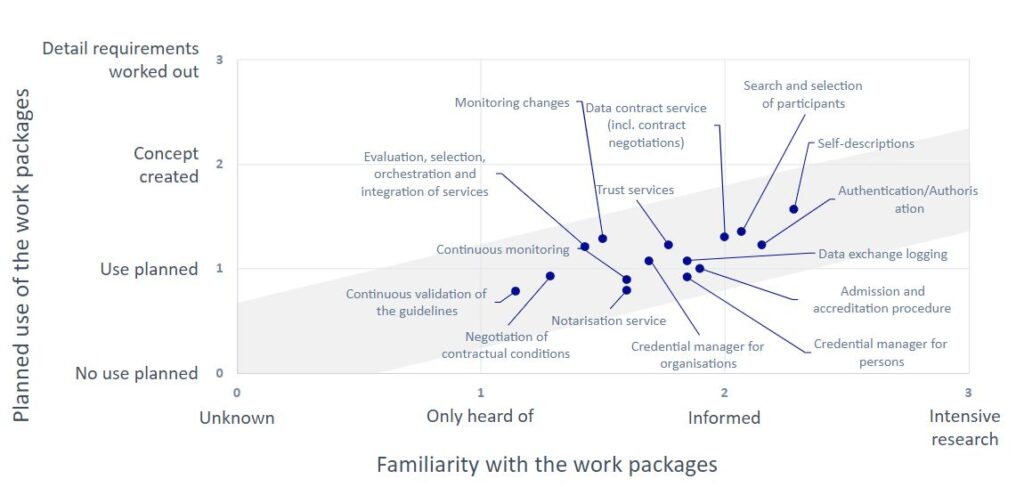
“We are currently at the stage where we are trying to break down the use cases granularly – at what point do which GXFS services come into play? And in the background is the technological preparation. We are working very closely on the Gaia-X or GXFS specifications.” – Dr Shalini Sahoo, Gaia-X Project Possible
At that point at the latest, the study authors expect that the users’ needs will also play a stronger role. In the expert interviews, they got the impression that not all projects sufficiently align technology and user perspectives. That is why they advise the project managers to directly involve the users in the project work. Opportunities for this include focus groups (especially with SMEs and private users), accompanying research (also comparative studies in other countries), or user studies by market research institutes.
Fact 3: Projects are keen to use the GXFS code
So far, the funded projects have punctually met their milestones. In the expert interviews, those responsible for the projects were confident that they would also achieve the next interim goals by the end of the year.
All interviewees emphasised the availability of the GXFS codes as the most important prerequisite for further progress. Their unanimous message: “Codes, codes, codes – even if they are ‘only’ beta versions!” In particular, the technical managers would tend to use provisional programme units in an early version for initial tests and prototypes, which is quite common in IT development.
“At Gaia-X, the first thing that’s being developed is not a new meta-product, but rather a common foundation based on transparently documented and defined standards and labels. That’s why it also takes time until there are achievable results. Currently, there are clearly defined specifications, but nothing to test yet. That’s the next step, which we can achieve, for example, through automation at the software level. Then we talk about codes and finally prototypes for use cases.” – Alina Rubina, Gaia-X Project Tellus.
Some funded projects already exercised their own developments before the launch of the GXFS. Some had started their work before the official start of the BMWK funding competition and had already developed preliminary solutions. Others created initial source codes during the Gaia-X hackathons. Based on these preliminary development stages, the projects gained experience and time. Due to the availability of the GXFS, they want to adapt their solutions to be Gaia-X-compliant.
“Participation in the hackathons is key to the progress of the project. The hackathons not only generate source codes, but also the reassurance of knowing that other projects have similar issues and problems.” – Gino Barnard, Gaia-X Project Possible.
In the meantime, ten of twelve GXFS code packages are now available. The remaining services are in progress, and we expect the catalogue service to be completed this quarter. The service for the Admissions & Accreditation topic is also being planned. The latter has experienced delays in contracting due to lack of external bids.
Fact 4: Trust, sovereignty & interoperability matter the most
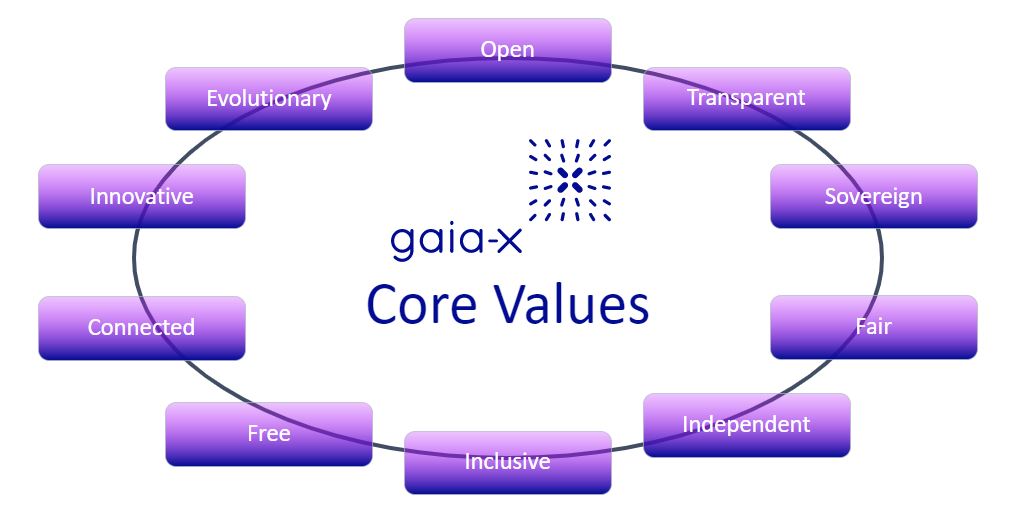
It became clear from the expert interviews that, for those responsible for the funded projects, the Federation Services are more than just a provider of the code for the function of federations. In addition to the technology, the interviewees see the values underlying the Federation Services and Gaia-X as decisive for all funded projects.
As is the case with the work packages, they also set priorities here: specifically, the topics of trust, sovereignty and interoperability are placed in the foreground as unique selling points of the Federation Services.
These values or goals also represent the most important user requirements for the overall Gaia-X project. In order for the initiative to establish itself in the market, future data spaces require
- the trust of participants, especially in SMEs
- genuine data sovereignty
- and cross-federation interoperability.
According to the respondents, this is the only way that Gaia-X can fulfil its promise of connecting a diverse landscape of providers and data owners in a federal data ecosystem, in line with European ideas.
At the same time, the participants have no illusions that technology alone could create trust in the market. Accordingly, some respondents expressed criticism on the “trust framework” term. In their opinion, trust can only be built over time. What can be built within the GXFS framework are secure systems. However, their operators and users must also experience this security in practice.
Fact 5: Gaia-X is above all a Europe-wide learning process
With Gaia-X, in 2019 the European Union launched one of the world’s most ambitious digitalisation projects. Member States and hundreds of companies are creating an ecosystem of data spaces that connects cloud platforms and data sources in line with European values. In the future, customers will be able to use digital services in a legally secure form and share data with each other in a trustworthy and sovereign manner.
In essence, Gaia-X is a user-driven community process. More than 350 member companies and organisations from business, science and public administration are organised in national hubs and working groups. They develop the technical standards for the data spaces in their sectors and topic fields.
The respondents to the expert interviews see GXFS as a central instrument that facilitates digitalisation at a completely new level for Germany and Europe. It is precisely in the combination of the various work packages that GXFS creates the technical prerequisites for data-driven business models in line with values such as interoperability, sovereignty and trust. As such, data silos can be broken down and exchanged in a self-determined manner.
“With cross-island services, we create enormous economic and business value in the industry.” – Wolfgang Müller, Gaia-X Project iECO.
The authors of the study were also impressed by another point that shows how serious all participants are and where the growing momentum for Gaia-X stems from:
Anyone who begins to deal with Gaia-X and GXFS needs one thing above all: staying power. All funded projects persevere and work their way through the collected material of technical articles, white papers, technical documentation and deep dives in a “focused homework activity”. A team created internal reading lists for the different project participants and updates them continuously to make the knowledge available in a compact form.
“Anyone who says there is not enough information has not yet gone through everything that is available. The challenge is to sift through everything, prioritise, and – finally – read.” – Gino Barnard, Gaia-X Project Possible.
Moreover, Gaia-X and the GXFS do not only solve technical problems. Likewise, the individual federations have to harmonise the economic interests of their members. All Gaia-X federations should commit to common minimum standards and rules for digitalisation. Gaia-X is therefore also a political initiative. Consequently, all the funded projects involved in the expert interviews define themselves in terms of their contribution to open digitalisation in Europe.
“This is a level of cooperation that we have not seen in any of the previous initiatives in the past twenty years. It’s really incredible. In the funded projects, companies are working together, some of whom are in tough competition with each other. Together, they manage to fulfil in months what each of them had previously failed to do on their own.” – Harald Wagener, Gaia-X Project Health-X.
The Project Management Office for the Federation Services will continue to closely monitor the progress of the funded service projects: We are planning a follow-up study on the implementation status of the Federation Services for summer 2023. By then, the pilot projects for the first data spaces will take shape. At the same time, a survey of public opinion will be conducted at the end of 2022 to assess the status of acceptance of Gaia-X.
The GXFS Connect post show video, you can find here: https://youtu.be/Bqdr_MNXQSI
